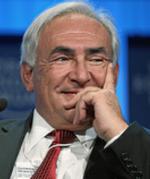 國際貨幣基金總裁史特勞斯-卡恩(Dominique Strauss-Kahn)1月30日於世界經濟論壇上表示,將創設一筆綠色基金,以提供資金予各國對抗氣候變遷與邁向低碳發展模式之需。而這筆基金在未來幾年內,可能需募集到每年1千億美元。
國際貨幣基金總裁史特勞斯-卡恩(Dominique Strauss-Kahn)1月30日於世界經濟論壇上表示,將創設一筆綠色基金,以提供資金予各國對抗氣候變遷與邁向低碳發展模式之需。而這筆基金在未來幾年內,可能需募集到每年1千億美元。
「我們將會提出與綠色基金相關的一些想法,一年挹注1千億美元,這是一般認為針對此問題所需要的數額,此基金以來自各國中央銀行的資本額為基礎,支援特別提款權(Special Drawing Rights)。」
卡恩說道,投資氣候變遷是一件重大議題,「不能被當作是無法解決的問題」。
在金融時報(Financial Times)經濟評論員Martin Wolf主持的這場討論世界經濟未來的座談中,卡恩表示,顯而易見地,發展中國家沒有金錢可投資在對抗氣候變遷所需的措施上,而同時已開發國家又因對抗全球金融危機而背負大量債務。
卡恩表示現在需要新的對策,並宣佈國際貨幣基金將在幾週後公佈一份報告,說明提案要如何申請融資。
他說,自全球經濟危機中重建時,各國必須採取低碳的發展模式。「我無法相信我們對此巨大問題毫無對策。」他對達沃斯的聽眾這樣說道。
卡恩表示,這樣一個基金的需要會變得清楚,是他反思聯合國12月7-18日在哥本哈根召開的第15屆氣候變遷綱要公約會議所得出的結果。
「這或許會讓你們部分人士感到驚訝,這竟會是國際貨幣基金會關心的事情,但這的確是,因為當我觀察哥本哈根所發生的,在我看來討論背後的問題並非僅是有約束力的規範或類似事務,而顯然是投資。」卡恩在座談中如此表示。
我們必須「跳脫思考限制」,卡恩說:「若是發展中國家因為償債能力問題而顯然無力支付氣候變遷的調適與減緩,而這直接連結至我們對此危機的對策,那我們將必須要找出新方法來給予融資。」
卡恩表示,國際貨幣基金將會和各國中央銀行與財政部會,就綠色基金的可行性展開討論,部份融資可能會採以額外的特別提款權來發行。特別提款權為國際貨幣基金在1969年為挹注會員國的官方準備帳所創造的儲備資產。
The head of the International Monetary Fund today proposed to create a multi-billion dollar Green Fund that would provide the financing that countries need to cope with climate change and move to a low-carbon growth model.
At the World Economic Forum in Davos, IMF Managing Director Dominique Strauss-Kahn said the funding needed could amount to $100 billion a year within a few years.
"We are going to provide some ideas built around a Green Fund devoted to finance the $100 billion a year, which is the figure which is commonly accepted that is needed for addressing the problem, based on a capitalization of this fund coming from central banks, backed by special drawing rights issued by the Fund, said Strauss-Kahn.
He said climate change financing is such a big issue that "it cannot be seen as a problem that cannot be solved."
During a panel discussion on the future of the world economy chaired by Martin Wolf of the "Financial Times," Strauss-Kahn said it is obvious that developing countries do not have the cash to finance the measures needed to tackle climate change, while developed countries are burdened with enormous debts from combating the global economic crisis.
Strauss-Kahn said alternative solutions are needed and announced that the IMF will release a paper in a few weeks setting out ideas on how the proposal can be financed.
He said the world must adopt a low-carbon model for growth as it rebuilds from the global economic crisis. "I can't believe we don't have the solution to this huge problem," he told the audience in Davos.
Strauss-Kahn said the need for such a fund became clear to him as he reflected on the outcome of the United Nations climate conference December 7-18 in Copenhagen, the 15th Conference of Parties to the UN Framework Convention on Climate Change.
"It may surprise some of you that this may be a concern for the IMF, but it is, because when I look at what happened in Copenhagen, it seems to me that the question behind the discussion was not only a question of binding requirements or things like that, but also obviously a question of financing," Strauss-Kahn told the panel today.
We have to "think out of the box," said Strauss-Kahn. "If it's obvious that developing countries don't have the money to pay for adaptation and mitigation of the climate change problem because they have this debt sustainability problem, directly linked to the solution we provide for this crisis, then we'll have to find innovative ways to finance it."
Strauss-Kahn said the IMF will start discussions with central banks and finance ministers on the feasibility of creating this Green Fund, possibly partly financed through the issuance of additional Special Drawing Rights, a reserve asset created by the IMF in 1969 to supplement its member countries' official reserves.
全文及圖片詳見:ENS







